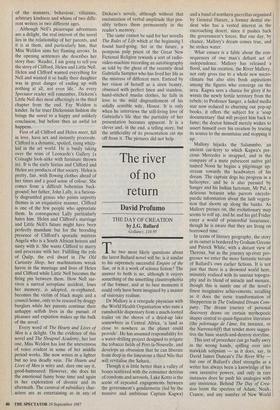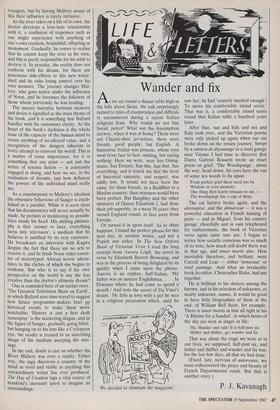The river of no return
David Profumo
THE DAY OF CREATION by J.G. Ballard
Gollancz, £10.95
The two most likely questions about the latest Ballard novel will be: is it similar to his supremely successful Empire of the Sun, or is it a work of science fiction? The answer to both is no, although it enjoys something of the unsettling claustrophobia of the former, and at its best moments it could only have been imagined by a master of visionary realism.
Dr Mallory is a renegade physician with the World Health Organisation who runs a ramshackle dispensary from a much-looted trailer on the shores of a dried-up lake somewhere in Central Africa, 'a land as close to nowhere as the planet could provide'. He has assumed responsibility for a water-drilling project designed to irrigate the tobacco fields of Port-la-Nouvelle, and develops an obsession that he can liberate from deep in the limestone a third Nile that will revitalise the Sahara.
Though it is little better than a valley of bones scattered with the consumer detritus of condoms and aerosols, Lake Kotto is the scene of repeated engagements between the government's gendarmerie (led by the massive and ambitious Captain Kagwa) and a band of northern guerrillas organised by General Harare, a former dental stu- dent who has a vested interest in the encroaching desert, since it pushes back the government's forces. But one day, by chance, Mallory's dream comes true, and he strikes water.
What ensues is a fable about the con- sequences of one man's defiant act of independence. Mallory has released a flood, and his creation, the River Mallory, not only gives rise to a whole new micro- climate but also stirs fresh aspirations among the figures who converge on the area. Kagwa sees a chance for glory if he wrests the newly fertile territory from the rebels; to Professor Sanger, a faded media star now reduced to churning out pop-up books, it offers the subject for a 'soap documentary' that will project him back to fame; the doctor himself merely wishes to assert himself over his creation by tracing its source to the mountains and stopping it up.
Mallory hijacks the Salammbo, an ancient car-ferry to which Kagwa's pre- cious Mercedes is strapped, and in the company of a mute pubescent native girl named Noon he begins a pilgrimage up- stream towards the headwaters of his dream. The captain dogs his progress in a helicopter, and he is also pursued by Sanger and his Indian factotum, Mr Pal, a delirious botanist who parrots encyclo- paedic information about the lush vegeta- tion that shoots up along the banks. As Mallory presses on, the evolutionary map seems to roll up, and he and his girl Friday enter a world of primordial luxuriance, though he is aware that they are living on borrowed time.
In terms of literary geography, the story at its outset is bordered by Graham Greene and Patrick White, with a distant view of Theroux, but as the journey up-river pro- gresses we enter the more fantastic terrain of Ballard's own earlier fictions. It is not just that there is a drowned world here, minutely realised with its saurian topogra- phy and its blend of miracle and menace, though this is surely one of the novel's finest imaginative achievements, recalling as it does the eerie transformation of Shepperton in The Unlimited Dream Com- pany. The dream journey of personal discovery draws on certain mythopoeic shapes central to quasi-figurative literature (the pelerinage de l'ame, for instance, or the Narrenschiff) that render more sugges- tive the basic search-and-destroy storyline.
This sort of procedure can go badly awry in the wrong hands, spilling over into mawkish solipsism — as it does, say, in David James Duncan's The River Why but one of Ballard's chief strengths as a writer has always been a knowledge of his own inventive powers, and only in rare instances does he push his analogies with any insistence. Behind The Day of Crea- tion loom the spectres of Adam, Noah, Crusoe, and any number of New World voyagers, but by having Mallory aware of this their influence is rarely intrusive.
As the river takes on a life of its own, the doctor develops a love-hate relationship with it, a confusion of responses such as one might experience with anything of one's own creation, brainchild, offspring or monument. Gradually, he comes to realise that he cannot keep the river as his own, and this is partly responsible for his wish to destroy it. In practice, the reality does not conform with his dream, for there are poisonous side-effects to this new water- shed and he risks losing control over his own monster. The journey changes Mal- lory, who goes native under the influence of Noon, and he becomes the follower of those whom previously he was leading.
The uneasy interplay between memory and desire is signalled as the main theme of the book, and it is something that Ballard handles with his customary clarity. At the heart of the book's darkness is the whole issue of the capacity of the human mind to create anything of un-alloyed value, and a recognition of the dangers inherent in every attempt to reinvent the world. This is a matter of some importance, for it is something that any artist — not just the writer of science fiction — is constantly engaged in doing, and here we see, in the realisation of dreams, just how deficient the powers of the individual mind really are.
As a counterpoint to Mallory's idealism the obsessive behaviour of Sanger is estab- lished as a parallel. While it is soon clear that his documentary will never actually be made, he persists in monitoring its possibi- lities inside his head. His chilling philoso- phy is that 'sooner or later, everything turns into television', a medium that he believes is justified by its very existence. He broadcasts an interview with Kagwa despite the fact that there are no sets to receive it, and he feeds Noon video casset- tes of stereotyped African movie adven- tures to the clichés of which she begins to conform. But who is to say if his own perspective on the world is any the less creative than the doctor's ultimate dream?
One is reminded here of an earlier story, `The Greatest Television Show on Earth', in which Ballard uses time-travel to suggest how future programme-makers beef up historical events to make them more watchable; 'History is just a first draft screenplay' is the marketing slogan, and in the figure of Sanger, gradually going blind, but hanging on to his lens like a Cyclopean eye, the reader is treated to an unsettling image of the medium usurping the mes- sage.
In the end, doubt is cast on whether the River Mallory was ever a reality. Either way, the saga discovers a country of the mind as vivid and viable as anything this extraordinary writer has ever produced. The Day of Creation taps a vital source of mankind's incessant quest to imagine its surroundings.



































































 Previous page
Previous page